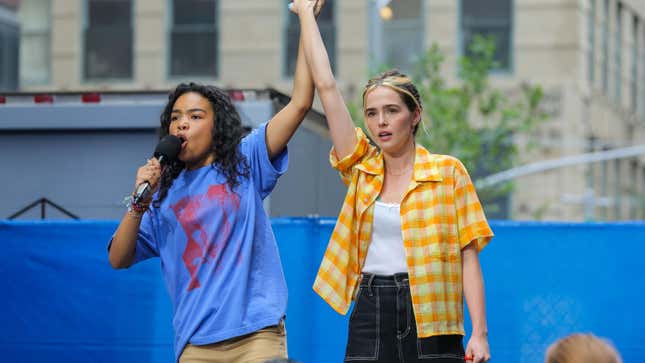Hulu’s ‘Not Okay’ Shows Us Everything That’s Not OK With White Women
The dark social media satire leaves its "unlikeable protagonist" right where she should be.
EntertainmentMovies

Watching Quinn Shephard’s sophomore film, Not Okay, which premiered over the weekend on Hulu, is like watching a train wreck: an undeniable disaster, but one that’s impossible to look away from.
The film opens with a content warning about “flashing lights, themes of trauma, and an unlikeable female protagonist”—the last of which the director included with a bit of a wink. But it’s very true: The central character, Danni Sanders (Zoey Deutch), is downright awful to the point of being difficult to watch as she claws her way toward fame and social media clout by faking having survived a terrorist attack in Paris. She has close to zero redeeming qualities. By the end of the film, the complete absence of any kind of redemption arc for Danni feels deserved and satisfying.
Recent reviews of the dark satire drama have honed in on its sharp insight around the toxicity of social media, the pitfalls of the ever-booming attention economy, and influencer culture writ large. In a desire to swap her unfulfilling job as a photo editor for a writing position at the magazine Depravity and to get the attention of her crush and coworker, weed influencer Colin (Dylan O’Brien), Danni floods her Instagram feed with Photoshopped images of her time at an imaginary Parisian writer’s retreat, transforming her mediocre life into a social media sensation overnight, a la Emily in Paris. Trouble strikes—or rather, implodes—when a series of bombings hit Paris, and Danni unknowingly posts a photo of herself in front of the Arc de Triomphe minutes before the attack, all from the safety of her Bushwick apartment.
-

-

-

-

-

-

-

-

-

-

-

-

-

-

-

-

-

-

-

-

-

-

-

-

-

-

-

-

-

-

-

-

-

-

-

-

-

-

-

-








































